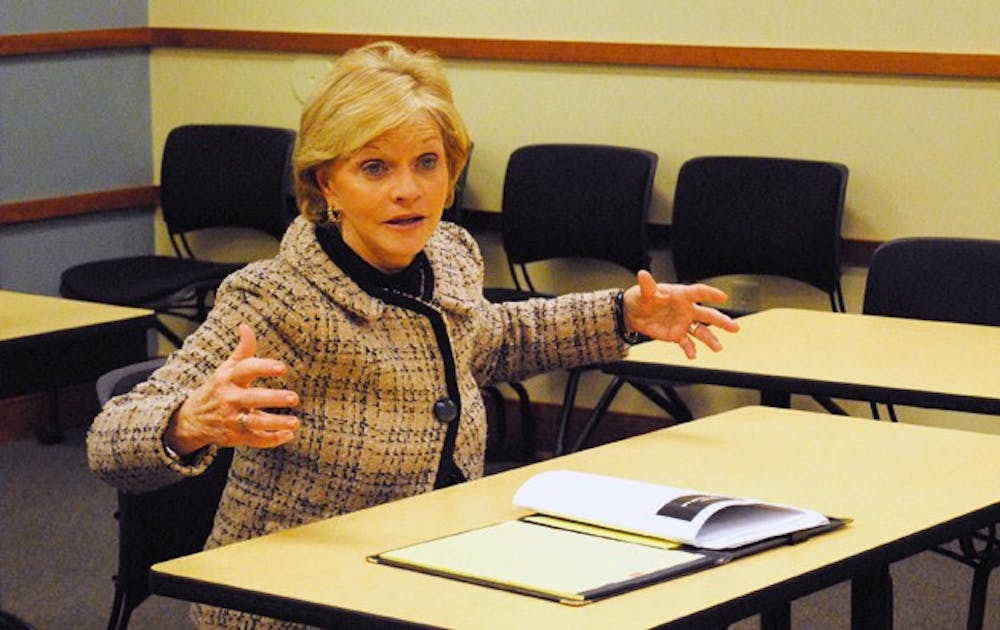Former Gov. Bev Perdue, who was recently appointed to a distinguished fellowship at the Sanford School of Public Policy, visited campus Tuesday to discuss education and policymaking with a small group of students.
Sanford Dean Bruce Kuniholm announced Friday that Perdue—the first female governor of North Carolina—will begin a distinguished fellowship at the University Fall 2013. Perdue will have an office at Sanford, allowing her to both serve as a resource for the Duke community and effectively utilize the University to continue her policy and education work.
“[Perdue’s fellowship] will be a symbiotic process between the needs and interests of students and faculty and the needs and interest of the distinguished fellow,” Kuniholm said. “A fellowship is, to a great extent, open-ended and non-restrictive. [Perdue] will be able to engage in any number of initiatives.”
Perdue, a longtime Democrat, served as North Carolina’s 73rd governor from 2009 to 2013. Before holding the governorship, she served for a decade as the state’s lieutenant governor, a decade as a state senator and four years in the state’s house of representatives. She holds a Ph.D in education administration and is known to be a champion of education across all levels—but particularly in early childhood education—in North Carolina. As the 2012 general elections approached, Perdue’s approval ratings sharply decreased, and she decided not to seek re-election, effectively marking her retirement from North Carolina politics.
Perdue said she is looking to spend the next phase of her life on a college campus where she can impart her wisdom and experience upon students. She is currently serving in a similar fellowship at Harvard University’s John F. Kennedy School of Government for the Spring 2013 semester, but she will return to North Carolina for her fellowship at Duke in the Fall. Although her Duke fellowship is currently slated for one semester, Perdue said she does not have solidified plans past that.
“I really love the academic and innovative atmosphere, and I love working with students, so I’ve got to figure out how to best satisfy that,” she said. “I want a relationship and involvement with the next generation of leaders—I want to be part of passing it on. At my age, that’s one of the biggest things you can do. We want to make sure there are many Duke grads who will be governors, presidents or school board members.”
As a fellow, Perdue will have the opportunity to serve as a mentor to students who are interested in politics. She said she will also hold daily office hours and will stay late once per week to host a dinner for students interested in working further with her. At Harvard, Perdue is currently auditing courses in religion and economics. Similarly, Perdue said she will attend classes at Duke, not only to provide her own unique input, but also to learn material she did not have the opportunity to learn as a young woman.
In that vein, the former governor visited professor Ken Dodge’s class—Children in Contemporary Society 495S: “Multidisciplinary Approaches to Contemporary Children’s Issues”—Tuesday. The capstone seminar is comprised of seven female seniors and focuses on discussing policy and ethics surrounding issues which pertain to American children. After Dodge, director of the Center for Child and Family Policy, introduced Perdue, she led an open discussion policymaking strategy, education and women in politics.
At the end of the discussion, Perdue opened up the floor to suggestions as to how she can best serve as a fellow at Duke. Senior Katherine Morrow, a member of Dodge’s class, said Perdue should be a role model for students interested in politics at Duke, especially women.
“You can speak to your path and experience as a politician in an informal advising format,” Morrow said to Perdue.
More than half of public policy majors at Duke are women, Kuniholm noted. In addition to being a resource for students, Perdue said she will work together with faculty to advance research and policy advising from the University. Although Perdue is most well known for her work in the field of education, she dealt with economic, environmental and criminal justice policy in her tenure as governor.
“We’re creating a context within which anything is possible,” Kuniholm noted. “Without overly defining what that role would be, she will be in residence, and she will a member of our intellectual community.”
Upon Perdue’s retirement from her field, North Carolina politics made a drastic shift to the right. For the first time in decades, the governor, lieutenant governor and state legislature are solidly Republican. In her time in academia, however, Perdue said she will not be loudly vocal in her opposition of some of the new state government’s policies to abide by what she called a “golden rule” of politics—that an outgoing politician remain relatively quiet in criticism of the incoming politician.
“I do not want to bring partisan politics to Duke,” she said.
After getting her taste of the Duke community in Dodge’s class, Perdue said she is very excited about her fellowship.
“Your generation can change the world,” Perdue said. “That’s why I’m at Duke—that’s why I want to come next Fall.”
Get The Chronicle straight to your inbox
Signup for our weekly newsletter. Cancel at any time.

